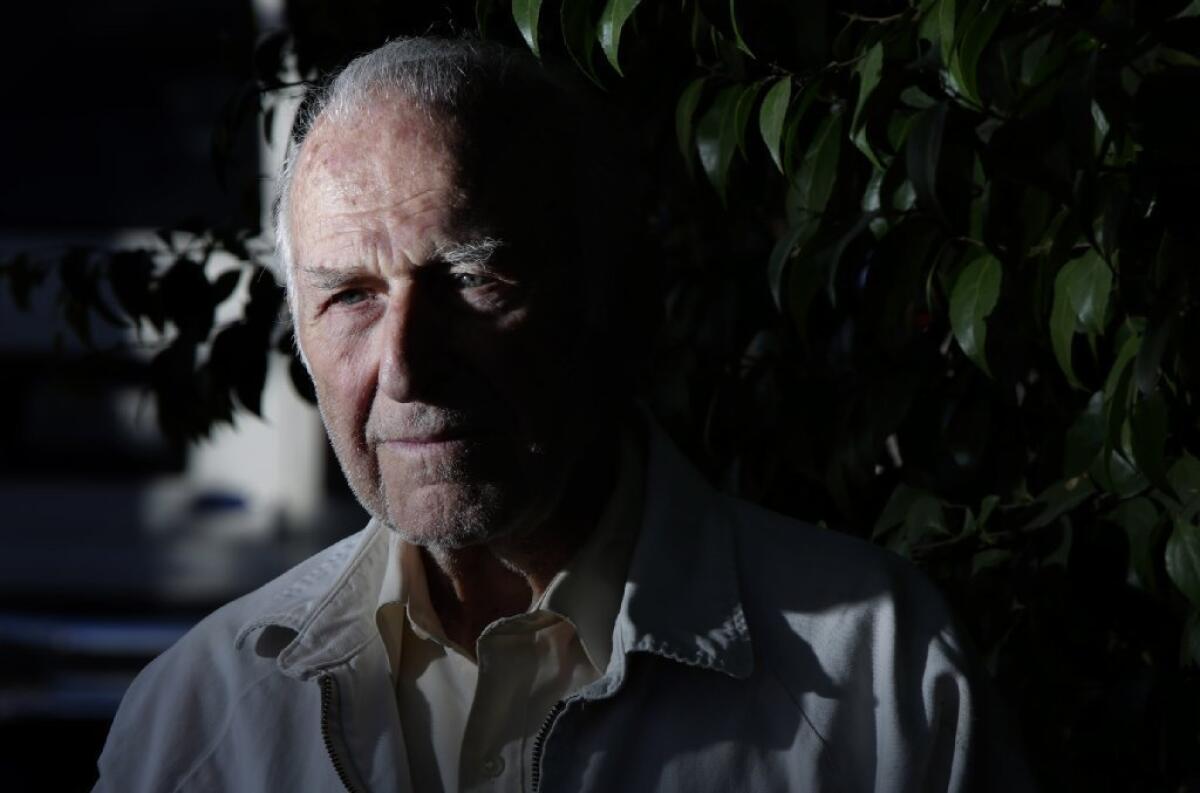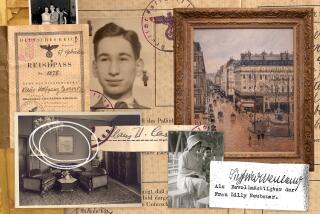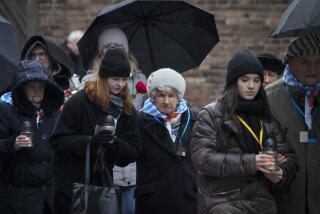Anaheim Holocaust survivor, 89, says reparations would be too late now

For Chasten Bowen, news that France is negotiating with the U.S. to pay reparations to Holocaust survivors who were transported on French rail cars to Nazi concentration camps during World War II comes too late.
“I’m just about ready to leave this world,” said the 89-year-old Anaheim resident. “If there’s money available, there are others who need it worse than I do.”
Stuart Eizenstat, a Washington lawyer who advises the State Department on Holocaust issues, said Friday that the French government entered into formal talks with the U.S. State Department on Feb. 6 regarding reparations and hopes to wrap up an agreement by the end of the year.
The SNCF, France’s national railroad, allegedly carried 76,000 Jews and other prisoners to Nazi concentration camps during the war. There are roughly 250 survivors of the French deportations living in the U.S.
The French, who previously resisted paying reparations to U.S.-based victims in part because there was no formal agreement between the two countries, appear to have been influenced by legislation pending in Congress to make it easier for victims to sue in U.S. courts. There are also by efforts in California, Maryland and Florida to block Keolis, a subsidiary of SNCF, from winning contracts to build or operate high-speed rail systems in the U.S.
Four months shy of 90, Bowen recalled this week the details of his transfer and imprisonment in the Buchenwald concentration camp in horrifying detail, though with calm detachment.
Bowen lived in Compton before becoming a radio operator and gunner in the U.S. Army Air Forces. In 1943, he and his B-17 crewmates were sent on a mission to bomb a German-run airfield near Versailles outside Paris. The base was camouflaged so heavily that the pilot missed it the first time and had to turn around and try again.
The Germans shot off the plane’s left wing, and the crew bailed out from 30,000 feet. Bowen said he landed on a plowed field, where a young boy pointed him toward the forest and urged him to run.
Bowen ducked under a bush just before a German soldier in pursuit passed by, his boots inches away.
Bowen hid in a fetid pig barn until a member of the French Resistance spirited him to a safe house. Arrangements were made to have him and another crew member driven to Paris to catch a flight to England.
The driver turned out to be Jacques Desoubrie, an infamous traitor and double agent who drove them directly to Gestapo headquarters and collected a bounty.
Bowen said he was put into solitary confinement in an ancient French prison then ordered to sign a paper, presumably a confession. When he refused, German soldiers placed him in front of a firing squad.
“All my cares went away,” he said. “I became flatlined.”
For unknown reasons, his life was spared. He and scores of others were loaded onto a boxcar headed for Buchenwald, a large concentration camp near Weimar, Germany. They were all stripped and deloused. Pointing toward the smokestack of the crematorium, a guard told him that the only way he would ever leave was “through that pipe.”
Bowen said he and his mates were beaten and subsisted on potatoes, thin slices of bread and foul broth flavored with blades of grass.
Eventually, Bowen said he and the other servicemen were transferred by boxcar to a POW camp near the Polish border. In February 1944, as Russian troops neared the camp, German soldiers roused them and marched them 65 miles through three feet of snow, then loaded them onto trains and took them to southern Germany. Gen. George S. Patton liberated the camp in 1945.
After the war, Bowen sold and repaired TVs.
Two years ago, the German government invited him and his family to Buchenwald. In April, the family plans to return for a tribute to Allied airmen who were held in Buchenwald.
“I’m not bitter,” Bowen said Friday in an interview. “I have always been maybe a little crazy, but I can’t bring myself to hate.”
Four years ago, Bowen testified in favor of a state measure that would have required rail companies interested in working on the California high-speed train project to admit whether they transported people to concentration camps during World War II. Gov. Arnold Schwarzenegger vetoed the bill.
Twitter: @MarthaGroves
More to Read
Start your day right
Sign up for Essential California for news, features and recommendations from the L.A. Times and beyond in your inbox six days a week.
You may occasionally receive promotional content from the Los Angeles Times.







